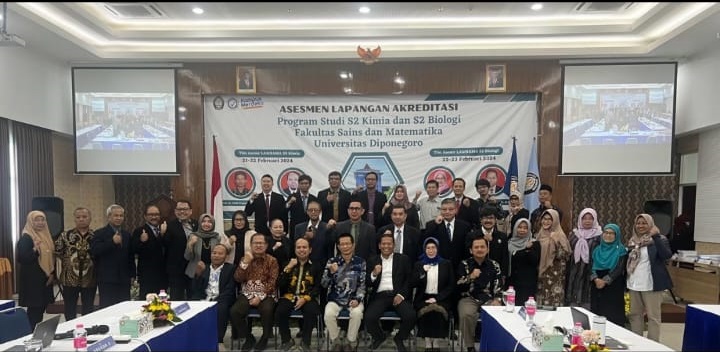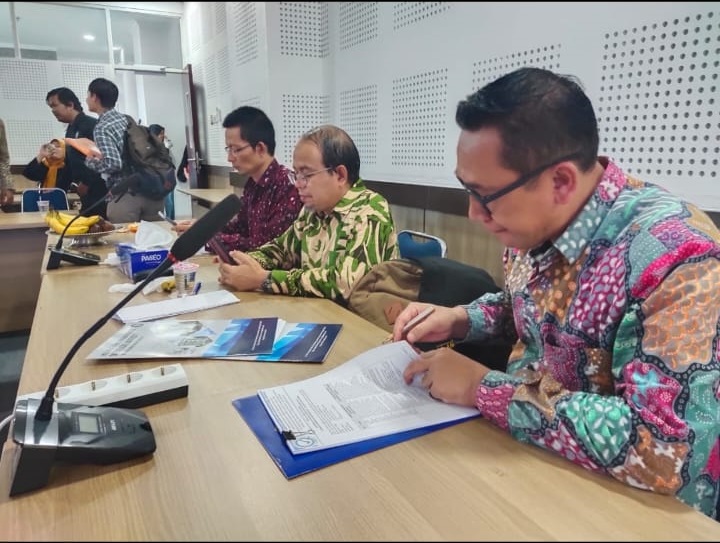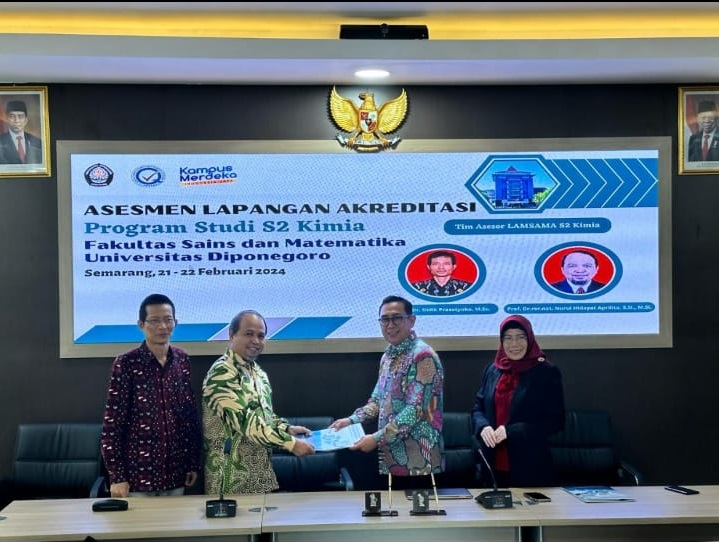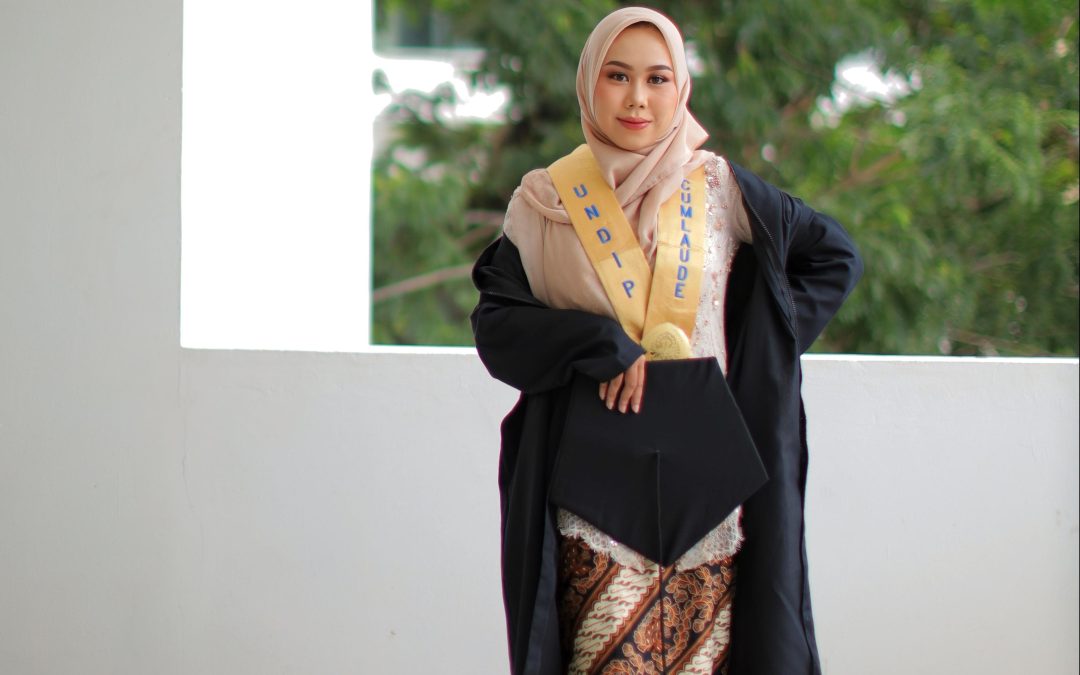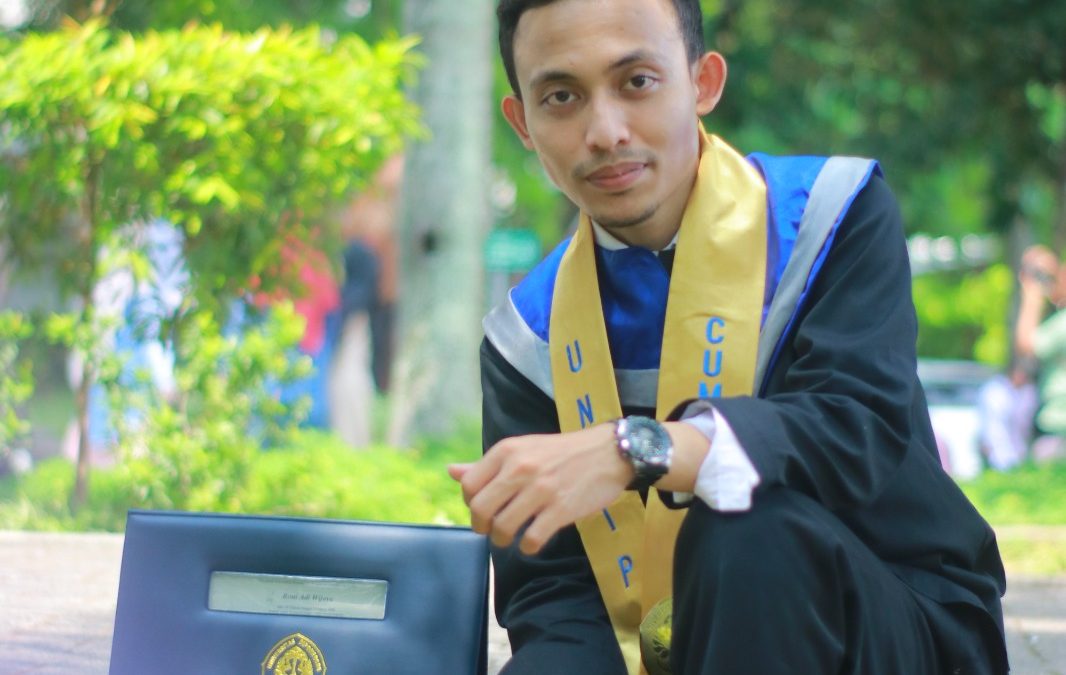
by mkim_wp | Mar 25, 2024 | Achievement, Announcement, News
The Master’s Program in Chemistry at Diponegoro University (Undip) has garnered prestigious recognition by achieving LAMSAMA (Independent Accreditation Agency for Higher Education) accreditation with an excellent rating. This decision is based on LAMSAMA Decree number 004/SK/LAMSAMA/Akred/M/III/2024. This accreditation rating marks an improvement from the previous rating of very good.
With this accreditation, the Master’s Program in Chemistry at Undip can now accommodate high-achieving and promising students, including those who receive prestigious scholarships such as LPDP.
This success is a tangible proof of the commitment and hard work of the faculty, students, alumni, and all parties involved in the development and improvement of the study program. The unwavering support from all these elements has been a cornerstone in achieving this accomplishment.
This accreditation is valid from March 21, 2024, until March 20, 2029, providing assurance of the quality and excellence of the Master’s Program in Chemistry at Undip in providing quality higher education for future generations.
Challenges ahead will undoubtedly be faced with renewed spirit and greater confidence, as this success is not the end of the journey, but rather the beginning of even higher achievements. We invite all parties to continue supporting and joining us in maintaining and improving the quality of higher education in Indonesia.
We extend our heartfelt gratitude to all parties who have contributed to this success. Let us together continue the struggle to achieve even more glorious achievements in the future.
Downoad: Accreditation decision letter

by mkim_wp | Feb 23, 2024 | News
On February 21 and 22, Diponegoro University (Undip) proudly conducted a field assessment for the accreditation of the Master’s Program (S2) in Chemistry. With a determination to enhance the quality of higher education, this assessment is expected to elevate the accreditation status of Undip’s S2 Chemistry program from “Very Good” to “Excellent.”
The festive opening ceremony of the assessment was graced by the presence of Undip’s new Rector, Prof. Dr. Suharnomo, S.E, M.Si. His presence provided a special motivation for the entire academic community of Undip in facing this evaluation process.
The field assessment was led by the new Head of the S2 Chemistry Program, Dr. Ngadiwiyana, S.Si, M.Si, who now leads the program for the upcoming period. Alongside him was the former Head of the S2 Program, Prof. Drs. Gunawan, M.Si, Ph.D., who also led the team in ensuring the smoothness and success of this assessment.

The assessors participating in this evaluation are experts in their respective fields. From the Independent Accreditation of Science and Mathematics (LAMSAMA) S2 Chemistry Undip, Prof. Dr. Didik Prasetyoko, M.Sc. from the Sepuluh Nopember Institute of Technology (ITS) and Prof. Dr. rer. nat. Nurul Hidayat Aprilita, S. Si., M. Si. from Gadjah Mada University (UGM) were present to provide in-depth insights and evaluations of the program.
The success in this assessment is a great hope for the entire academic community of Undip. With collective spirit and hard work, it is hoped that the accreditation of Undip’s S2 Chemistry program can be elevated to a higher level, namely “Excellent.” This step will undoubtedly be a significant boost in maintaining the quality of higher education in the field of chemistry, as well as producing graduates ready to compete at the national and international levels.
This spirit serves as a driving force for all parties involved to continue innovating and adapting to the latest developments in higher education. With continuous efforts, it is hoped that Undip’s S2 Chemistry program will remain the top choice for prospective students interested in pursuing careers in chemistry.


by mkim_wp | Dec 20, 2023 | News, Research & Community Service
In the realm of chemical research, Brainy Happy Ana Tasiman, a master’s student at Diponegoro University, has successfully made a breakthrough through her thesis titled “Synthesis and Characterization of Bismuth Oxide/Carbon Quantum Dots Photocatalyst as a Degrading Agent for Dyes.”
Degrading Dyes with Photocatalysis
This research focuses on the development of an effective photocatalyst for degrading various types of dyes. Brainy Happy Ana Tasiman chose to combine Bismuth Oxide (Bi2O3) with Carbon Quantum Dots (CQDs) as a photocatalytic agent. The addition of CQDs is expected to optimize the photocatalytic process in degrading complex dyes.
Innovative Material Synthesis
In her thesis, Brainy Happy Ana Tasiman successfully synthesized an innovative material, namely the Bismuth Oxide photocatalyst enriched with Carbon Quantum Dots. This synthesis process involved meticulous steps to ensure efficient integration between Bismuth Oxide and CQDs, resulting in a material with superior photocatalytic properties.
Optimizing the Photocatalysis Process
This research proves that the addition of CQDs significantly enhances the performance of Bismuth Oxide photocatalysis in degrading dyes. This success could pave the way for the development of new methods to clean water contaminated by industrial dye pollutants.
The Importance of Liquid Waste Management
On a global scale, the management of liquid waste from textile, dyeing, and chemical industries often poses a serious challenge. Brainy Happy Ana Tasiman’s research makes a positive contribution to environmentally friendly solutions to address this issue.
Hope for a Cleaner Future
The thesis advisor, research colleagues, and students at Diponegoro University highly appreciate Brainy Happy Ana Tasiman’s contribution to this research. This breakthrough is not only a step forward in the field of chemistry but also opens opportunities to create a cleaner future through the development of photocatalysis technology.
Diponegoro University Continues to Encourage Innovation
Diponegoro University proudly supports research and innovation efforts that can provide real solutions to global environmental challenges. The hope is that this research can serve as a starting point for further studies in the development of photocatalysts for cleaning water from dyes and other pollutants.
[This article is based on information provided by Brainy Happy Ana Tasiman and the results of her thesis research.]

by mkim_wp | Nov 23, 2023 | News
In an ongoing effort to advance renewable energy, Roni Adi Wijaya, a master’s student in chemistry at Diponegoro University, has achieved a breakthrough in the synthesis of thin CuInS2 photocathodes. This research focuses on the process of splitting water molecules into hydrogen and oxygen gases using the synthesized photocathode.
Delving into the Water Splitting Process
The aim of this research is to produce hydrogen gas, which can then be used as a renewable energy fuel. By employing a photocathode, the water-splitting process can be efficiently driven by light energy. The hydrogen gas produced from this process can be a sustainable solution to meet future energy needs.
Variation in Sulfurization Sources
A key aspect of this research is the variation in sulfurization sources used in the photocathode synthesis. Roni Adi Wijaya considered the use of H2S, Thiourea, and Sulfur as sulfurization sources to observe their impact on the characteristics of the photocathode. The results of the research show that the choice of sulfurization source has a significant impact on the efficiency of hydrogen gas conversion.
Role of Pt-In2S3 as a Modifier
Furthermore, this research also discusses the role of Pt-In2S3 layers as a modifier. These layers are applied to enhance the characterization of the photocathode and the efficiency of hydrogen gas conversion. Roni Adi Wijaya successfully demonstrated that the addition of Pt-In2S3 layers can improve the performance of the photocathode in the water-splitting process.
Implications of the Research on Renewable Energy
The results of this research have positive implications for the development of renewable energy technology. By understanding the influence of sulfurization source variation and the role of Pt-In2S3 layers, this research provides new insights into how to enhance the efficiency of hydrogen gas conversion from the water-splitting process.
Contribution to Sustainable Development
Roni Adi Wijaya has made a valuable contribution in the quest for solutions to future energy needs. His research opens doors for further development in the synthesis of photocathodes and their application in renewable energy production.
Diponegoro University proudly supports innovation and research that can make a positive contribution to sustainable development. It is hoped that this research can serve as a foundation for further developments in the field of renewable energy.
[The author is a Admininstrator of Magister Chemistry Program at Diponegoro University. This article is based on information provided by Roni Adi Wijaya.]

by mkim_wp | Sep 22, 2023 | Achievement, News
In a remarkable display of scientific prowess, a team of talented innovators from Chemistry DIponegoro has clinched the Silver Medal at the prestigious World Young Inventors Exhibition (WINTEX) held during Indonesia Inventors Day (IID) 2023. This achievement is a testament to their dedication, creativity, and commitment to pushing the boundaries of scientific research.
The winning team comprises five exceptional individuals who have demonstrated their excellence in the field of chemistry:
Rahmalillah Khairiah (Magister Chemistry Program 2022)
Roni Adi Wijaya (Magister Chemistry Program 2021)
Eugene Julius Chang (Bachelor Chemistry Program 2020)
Indah Marita Dewi (Bachelor Chemistry Program 2020)
Tittovitto Geoffrey Yonathan (Bachelor Chemistry Program 2020)
Their project, titled “SYNTHESIS OF ACTIVE CARBON DERIVED FROM RICE HUSK AS A VITAMIN E DELIVERY SYSTEM UNDER SIMULATED INTESTINAL CONDITIONS,” stands as a testament to their innovative spirit and dedication to advancing scientific knowledge.
The team’s project centers around a groundbreaking concept – utilizing active carbon derived from rice husks as a novel vitamin E delivery system, specifically designed to perform under simulated intestinal conditions. This innovation represents a significant leap in the field of drug delivery systems.
Under the guidance of their mentor, Dra. Arnelli, MS, these young inventors have developed a solution that has the potential to revolutionize the way vitamins and nutrients are delivered to the human body. The targeted and controlled release of vitamin E, made possible by their unique active carbon-based delivery system, holds immense promise for enhancing the effectiveness of nutritional supplements and medications.
The journey to the Silver Medal at WINTEX 2023 was no easy feat. It involved tireless research, countless experiments, and unwavering determination. The team’s ability to address complex challenges and find innovative solutions is truly commendable.
This accomplishment not only brings pride to their alma mater but also serves as an inspiration to aspiring young scientists and inventors across Indonesia. It underscores the importance of investing in education, research, and innovation to drive progress in various fields.
As these promising innovators continue to push the boundaries of scientific discovery, their success at WINTEX 2023 serves as a reminder of the boundless potential that exists within Indonesia’s scientific community. With their determination and creativity, they are paving the way for a future marked by innovation and advancements that benefit society as a whole.
In conclusion, Rahmalillah Khairiah, Eugene Julius Chang, Indah Marita Dewi, Roni Adi Wijaya, and Tittovitto Geoffrey Yonathan have not only secured a Silver Medal but have also secured their place as trailblazers in the world of scientific research and innovation. Their achievement at WINTEX 2023 is a source of pride for Indonesia and a beacon of hope for a brighter and more innovative future. We look forward to witnessing their continued success on the global stage. 🏅🌟 #WINTEX2023 #IID2023 #Innovation #Science #IndonesianInnovators


